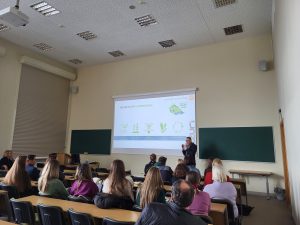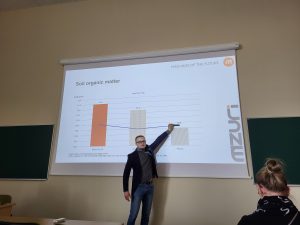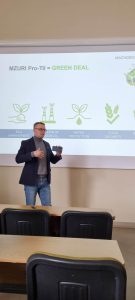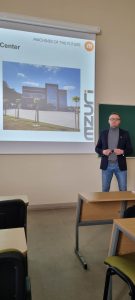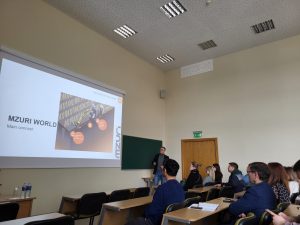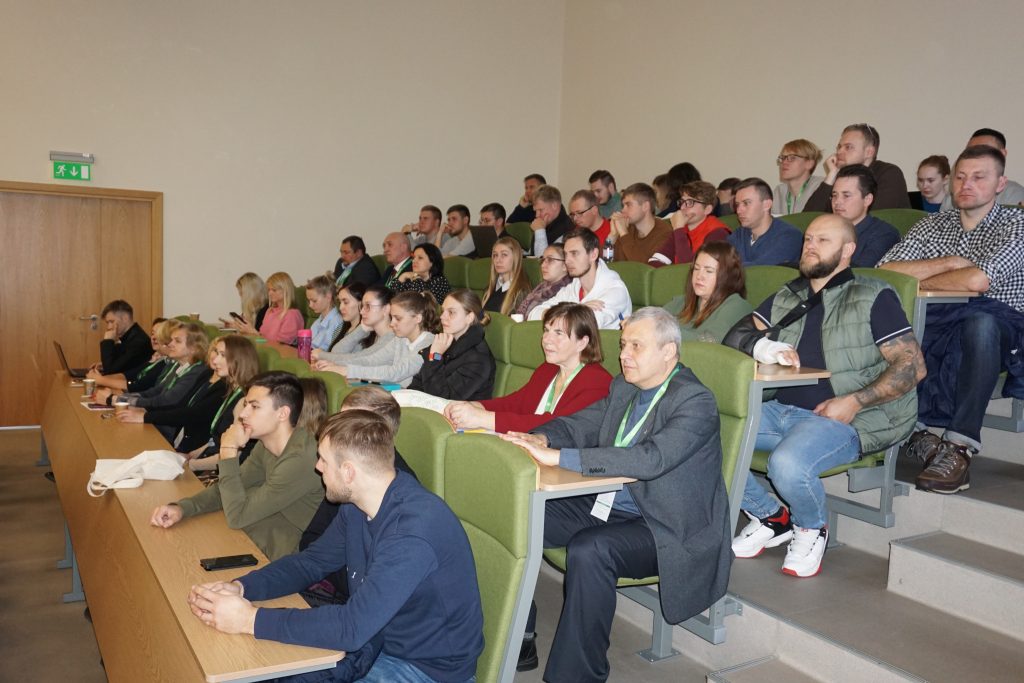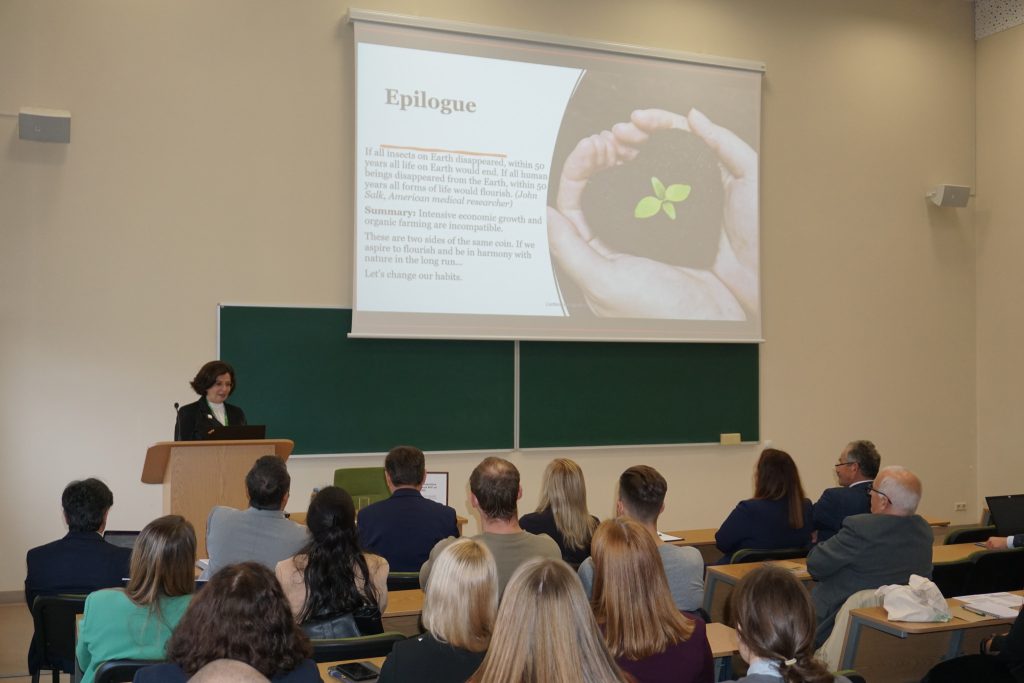11th International Scientific Conference “Rural Development 2023: Bioeconomy for The Green Deal”
We kindly invite You to the 11th International Scientific Conference “RURAL DEVELOPMENT 2023: Bioeconomy for the Green Deal”, which will take place in Vytautas Magnus University Agriculture Academy (Lithuania), 26-28 September, 2023.
This conference is aimed at providing interdisciplinary scientific discussion, presenting new ideas for rural development processes in the context of Bioeconomy, Climate Change, Innovations and Social Progress.
The main topics of Conference sessions:
- Agro-innovations and Food Technologies;
- Biosystems Engineering and Environmental Integrity;
- Multifunctional Approach for Sustainable Use of Bio-Resources;
- Social Research for Sustainable Bioeconomy and Climate Change.
Business and Science Forum “Connecting the Dots: A Roadmap for Lithuanian Bioeconomy Development” will be held during the Conference.
Conference keywords: Innovations, Integrity, Bio-resources, Well-being.
Important dates and deadlines:
- Until September 15th, 2023 – registration (extended)
- Until September 26th, 2023 – article submission (extended)
- Until September 10th, 2023 – payment of participation fee
- January, 2024 – publishing of the Conference proceedings
| Participation fee | In person (EUR) | Online (EUR) |
| Authors until August 27th | 250 | 170 |
| Authors after August 27th | 300 | 220 |
| PhD students | 125 | 100 |
| Non-authors | 150 | Free of charge |
Participation fee in person covers not only the Conference proceedings, but also coffee breaks, lunches and gala dinner. The costs of accommodation, cultural (social) programme and transport should be covered by the participants of the Conference.
Speakers of the conference pay the participation fee after receiving information about the confirmation of the topic of the presentation.
Certificates of participants will be sent by e-mail after the conference.
More information about the Conference
Online Registration on the Conference website.
Information for authors.
New design, more user-friendly Conference website: https://www.ruraldevelopment.lt/
Conference e-mail: rural.development@vdu.lt
 This Conference starts a cycle of events dedicated to the 100th anniversary of the Vytautas Magnus University Agriculture Academy.
This Conference starts a cycle of events dedicated to the 100th anniversary of the Vytautas Magnus University Agriculture Academy.
VMU Agriculture Academy Graduation Ceremonies
On 16-23 June, Vytautas Magnus University (VMU) invites everyone to participate in festive graduation events.
On 21 June, a graduation ceremony will be held for the graduates of the VMU Agriculture Academy, Faculty of Forest Sciences and Ecology, Faculty of Engineering, Faculty of Bioeconomy Development, and Faculty of Agronomy.
FESTIVE HALL OF VMU AGRICULTURE ACADEMY | STUDENTŲ G. 11, AKADEMIJA, KAUNO RAJ.
10 a.m. Graduation ceremony of the AA Faculty of Forest Sciences and Ecology
12 p.m. Graduation ceremony of the AA Faculty of Engineering
2 p.m. Graduation ceremony of the AA Faculty of Bioeconomy Development
4 p.m. Graduation ceremony of the AA Faculty of Agronomy
The events will be photographed and/or filmed; therefore, please note that you might be featured in photos or videos which can be published in various media outlets.
Landscape design afternoon at VMU AA: meeting with the president of IFLA and opening of the exhibition
Vytautas Magnus University Academy of Agriculture (VMU AA) invites to the “Landscape Design Afternoon” on June 5. During the event, the exhibition of the European region of the International Union of Landscape Architects (IFLA) “Rethinking Nature” will be opened, VMU AA Landscape Design studies will be presented, the afternoon participants will have the opportunity to hear IFLA President Bruno Marques’ presentation “IFLA is all of us: why we need a unified landscape architect profession ?”.
International Union of Landscape Architects (IFLA) European Regional Exhibition “Rethinking Nature”
The exhibition presents large and small-scale landscape architecture projects from 20 countries (including Lithuania), which are in harmony with nature and use nature-based solutions. The exhibition will be open until June 30, 2023.
IFLA is all of us: why we need a unified landscape architecture profession
Although the world has changed a lot since its inception, the International Union of Landscape Architects (IFLA) and landscape architects around the world are fighting the same battles. We are a 21st century profession and well equipped to deal with the pressures that will shape new lifestyles and creativity for generations to come. This talk will review the state of the profession and present the essential role landscape architects play in advancing the profession by demanding the highest standards of education, training, research and professional practice. Together, we will continue to raise awareness of landscape architecture around the world and promote the sustainable management and design of our natural and built environments.
Event date: June 5. (Monday)
Event time: 1:00 p.m.
Place of the event: VMU AA Central palace 505 aud. (Studentų str. 11, Akademija, Kaunas district)
More information:
Lekt. Mantas Pilkauskas
mantas.pilkauskas@vdu.lt,
+370 615 78995
Lecture by Łukasz Lewandowski: Towards CO2 reduction, healthier soil, lower fuel and working time costs
On the 30th of March, Łukasz Lewandowski, a business partner who came under the Erasmus+ program, visited the Faculty of Agronomy and gave a lecture to the gathered students and lectures about the application of Strip-Till technology, the preservation of moisture in the soil, the reduction of gas emissions, the modernization of the farm and the economy of its management. The speaker shared his practical experience in business and his own farm, theoretical knowledge, colleagues’ from Poland and the first results of his own scientific research.
During the meeting, there was a discussion about the negative impact of intensive farming and heavy use of chemical agents on agricultural and natural ecosystems. As one of the possible solutions, the lecturer proposed the Strip-Till seeding technology for strip tillage, soil fertilization and sowing at the same time. By sowing directly into the stubble field, high soil fertility is maintained, about 30% less fertilizer is used before sowing, fuel consumption is reduced by 3 times, time and human resources are saved. The seeds are placed in moist, well-aerated, well-structured soil. Favorable air and moisture conditions lead to intensive plant rooting, development and, of course, abundant, good quality harvest. Applying technologies with a sustainable impact on the environment, abandoning intensive soil plowing and cultivating, together with reducing fuel consumption, can significantly limit CO2 and N2O emissions.
The end of the lecture was crowned by a discussion between the gathered students, lectures and the speaker. Łukasz Lewandowski was willing to share his thoughts on reducing pesticides on the way to sustainable and healthier farming.
11th International Scientific Conference “Rural Development 2023: Bioeconomy for The Green Deal”
We kindly invite You to the 11th International Scientific Conference “RURAL DEVELOPMENT 2023: Bioeconomy for the Green Deal”, which will take place in Vytautas Magnus University Agriculture Academy (Lithuania), 26-28 September, 2023.
This conference is aimed at providing interdisciplinary scientific discussion, presenting new ideas for rural development processes in the context of Bioeconomy, Climate Change, Innovations and Social Progress.
The main topics of Conference sessions:
- Agro-innovations and Food Technologies;
- Biosystems Engineering and Environmental Integrity;
- Multifunctional Approach for Sustainable Use of Bio-Resources;
- Social Research for Sustainable Bioeconomy and Climate Change.
Business and Science Forum “Connecting the Dots: A Roadmap for Lithuanian Bioeconomy Development” will be held during the Conference.
Conference keywords: Innovations, Integrity, Bio-resources, Well-being.
Important dates and deadlines:
- Until September 15th, 2023 – registration (extended)
- Until September 26th, 2023 – article submission (extended)
- Until September 10th, 2023 – payment of participation fee
- January, 2024 – publishing of the Conference proceedings
| Participation fee | In person (EUR) | Online (EUR) |
| Authors until August 27th | 250 | 170 |
| Authors after August 27th | 300 | 220 |
| PhD students | 125 | 100 |
| Non-authors | 150 | Free of charge |
Participation fee in person covers not only the Conference proceedings, but also coffee breaks, lunches and gala dinner. The costs of accommodation, cultural (social) programme and transport should be covered by the participants of the Conference.
Speakers of the conference pay the participation fee after receiving information about the confirmation of the topic of the presentation.
Certificates of participants will be sent by e-mail after the conference.
More information about the Conference
Online Registration on the Conference website.
Information for authors.
New design, more user-friendly Conference website: https://www.ruraldevelopment.lt/
Conference e-mail: rural.development@vdu.lt
 This Conference starts a cycle of events dedicated to the 100th anniversary of the Vytautas Magnus University Agriculture Academy.
This Conference starts a cycle of events dedicated to the 100th anniversary of the Vytautas Magnus University Agriculture Academy.
Conference of Young Scientists „YOUNG SCIENTIST 2023“
The 20th Conference of Young Scientists YOUNG SCIENTIST 2023 will be held on 29 March 2023 (remote). The conference is intended for first, second, and third-degree students. Its goal is to engage the students in research activities, cultivate the skills of public presentation of the research findings, present the research achievements, and hold discussions on the relevant issues of bioeconomy, Green Deal, climate change, ecosystem sustainability, rational use, and protection of natural resources. Participants of the conference will be awarded the participation certificates.
More details about Conference and Online Registration on the conference website: https://zua.vdu.lt/en/conference-young-scientist-2023/
Scientific papers online submission: Conference Proceedings YOUNG SCIENTIST 2023
Visit our website to read the full announcement.
________________________________________________________________________
Conference “Young Scientist 2022”
Greetings from VMU Agriculture Academy. Happy and hopeful holidays!
Dear community,
This period is a great time to give a thanks for the gift of friendship, to celebrate the dreams came true and the work done in cooperation. We wish everyone to cherish and grow what we have and light up a bright, peaceful and creative future!
“ERASMUS+” training courses at Europass Teacher Academy in Florence
On 05 – 10 December 2022, assoc. prof. dr. Jurgita Kulaitienė, assoc. prof. dr. Nijolė Vaitkevičienė and lecturer dr. Dovilė Levickienė of the Department of Plant Biology and Food Sciences from Vytautas Magnus University Agriculture Academy (VMU AA), Faculty of Agronomy, were participating in the courses “There Is an App for That! Exploring the Best Apps for Teaching and Student Learning” that were held at Europass Teacher Academy in Florence (Italy).
In these courses, teaching staff from Croatia, Spain, Germany, Greece, and Lithuania were attended.
During the courses, teachers used different educational apps in class. These apps allow structure information, to better analyze, comprehend, synthesize, recall and generate new ideas. They acquainted with the most popular and practical educational apps for teaching and student learning across a wider range of subjects. Teachers learned how to properly integrate these apps in the classroom as a tool to support their learning.
As well as, the visit has given an opportunity to work on English language and to know their history, culture and people.
Innovative ideas and solutions at the conference “AgroEco2022: Agroecosystem Sustainability: Links between Carbon Sequestration in Soils, Food Security and Climate Change”
On October 26-27, the 4th international scientific conference “AgroEco2022: Agroecosystem Sustainability: Links between Carbon Sequestration in Soils, Food Security and Climate Change” was held at the Vytautas Magnus University Agriculture Academy (VMU AA). The participants of the conference shared knowledge on topics relevant to the agro-sector – the focus was on the soil health and carbon sequestration for sustainability, soil and crop management towards a chemical pesticide-free agriculture, biodiversity, crop and production diversification, precision farming and digital technologies, food quality and safety, climate change mitigation.
Seeks to focus efforts on finding ways to reduce pesticide use
Welcoming the participants, the chairman of the conference organizing committee, researcher of the Faculty of Agronomy of VMU Agriculture Academy, assoc. prof. dr. Zita Kriaučiūnienė was happy that this time the conference was held not online, but in a regular format. “This year, about a hundred participants from different countries: Lithuania, Latvia, Estonia, Sweden, Poland, Germany, France, Spain, Ireland, Belgium, Turkey, Moldova, Brazil and others can meet and communicate in person. For researchers, this is a unique opportunity to exchange knowledge, make connections, and for our students – to learn from the leaders in the field”, – said dr. Z. Kriaučiūnienė.
Head of the Department of Agroecosystems and Soil Sciences, Faculty of Agronomy at VMU Agriculture Academy, prof. dr. Vaclovas Bogužas noticed that the conference, which is being organized for the fourth time, is characterized by an abundance of exceptional presentations and a great interest of scientists and students. “Sustainability of agroecosystems is a very relevant topic in today’s context, because, taking into account the Green Deal of the European Union (EU) and the Sustainable Development Goals of the United Nations, agriculture aims to reduce the use of pesticides and mineral fertilizers and maintain healthy soil. Many challenges arise in the implementation of these goals, scientists conduct research and look for the new solutions. This conference is a great opportunity to share research results and insights, to spread innovative ideas and to find solutions by pooling our strengths”, – dr. V. Bogužas emphasized the importance of the international conference.
The importance of research in finding relevant solutions
Emphasizing the relevance of the conference topics in the context of the EU Green Deal, chancellor of VMU Agriculture Academy prof. dr. Astrida Miceikienė pointed out that the topics are important for all states. “I am glad that scientists from different countries, institutions and different fields, who want to share knowledge, experience and cooperate in finding new solutions to global challenges, are participating in the conference. It is important to find the ways to achieve your goals with as little negative impact on the environment as possible. To illustrate this aspiration, it is worth sharing the idea of John Stalk, who states that if insects disappeared from the earth, the life of all the planet would disappear after the five decades, while if people disappeared, living nature would flourish just after the fifty years”, – said prof. dr. A. Miceikienė.
Kristina Simonaitytė, advisor to the Minister of Agriculture of the Republic of Lithuania, speaking on behalf of the minister, drew attention to the issue of ensuring food supply, which has gained special importance on the political agenda due to the ongoing war in Ukraine and its impact on agricultural supply chains. According to the representative of the ministry, it is very important not to forget the continuing trends of climate change and biodiversity loss, which pose an increasing threat to the security of global food supply chains.
According to the vice-president of the Lithuanian Academy of Sciences academician prof. habil. dr. Zenonas Dabkevičius, although much attention is now being paid to the issue of climate change, the agricultural sector faces not only the problem of climate change, but also the equally challenging rise in the prices of all resources. “We can abandon some elements of agrotechnology, but we need to know to what and how to replace them. Modern agriculture requires modern knowledge and abilities, and for this it is necessary to have recommendations and solutions based on scientific research”, – said prof. habil. dr. Z. Dabkevičius, pointing to the challenges faced by the agricultural sector and the expected recommendations of the scientists.
A unique opportunity to get acquainted with innovative scientific research
Dean of the Faculty of Agronomy at VMU Agriculture Academy, assoc. prof. dr. Aida Adamavičienė emphasized that this international conference is an exceptional opportunity for the academic community to get acquainted with the innovative research and results of the scientists looking for solutions to the challenges of the agro-ecosector.
“We are the ones who have to take care that the soil be healthy, and that people eat healthy food, that there is no hunger, that we ensure the smooth functioning of important areas, that is why this conference is especially important. We are glad that many high-level scientists, who are conducting research related to the globally relevant topics of the organic agro-sector, have arrived from various countries. Scientists, presenting reports and participating in discussions, openly shared their experience and research. They are the leaders, who can contribute to the initiation of the adoption of laws that are extremely important for agriculture and to the attraction and retention of the young generation of scientists in the field of scientific research”, – assoc. prof. dr. A. Adamavičienė summed up.
4th International Scientific Conference AgroEco2022
We kindly invite You to participate in the 4th International Scientific Conference AgroEco2022: Agroecosystem Sustainability: Links between Carbon Sequestration in Soils, Food Security and Climate Change which will be held at Vytautas Magnus University Agriculture Academy (VMU AA), Lithuania, on October 26–27th, 2022.
Main scientific topics of the Conference:
- Soil health and carbon sequestration for sustainability
- Soil and crop management towards a chemical pesticide-free agriculture
- Biodiversity, crop and production diversification
- Precision farming and digital technologies
- Food quality and safety
- Climate change mitigation
More information about the Conference
Early REGISTRATION extended until 15thOctober. Late registration until 20thOctober.
Abstract submission is extended until 15th October.
E-mail for inquiries: agroeco@vdu.lt
We are looking forward to seeing you at the conference!
Organisers of AGROECO2022
- About
- About Agri-Food BM programme
- Academic infrastructure units
- All events
- All news
- Aquaculture center
- Archives
- Biosystems Engineering
- Center of Animal husbandry selections, breeding values and dissemination
- Centre of Biosystems Engineering, Biomass Energetics and Water Engineering
- Circular Biobased Economy
- Climate change
- Contacts
- Contacts
- Events
- Events archive
- Faculties
- For business and society
- Innovative products
- International Cooperation
- International projects
- Joint Research Centre of Agriculture and Forestry
- Journal “Human and Nature Safety”
- Laboratory of Technology Safety
- Laboratory services
- Living Environment
- More labs
- News
- Project
- QUALS project description
- Research
- Research areas
- Scientific events
- Scope
- Sitemap
- Studies
- Study programmes
- Technology Transfer & Commercialization
- THE ROLE OF ORGANISATION IN THE PROJECT
- THE ROLE OF ORGANISATION IN THE PROJECT
- THE ROLE OF ORGANISATION IN THE PROJECT
- The Study Process
- Žemės ūkio žinių ir inovacijų sistemos klasteris







